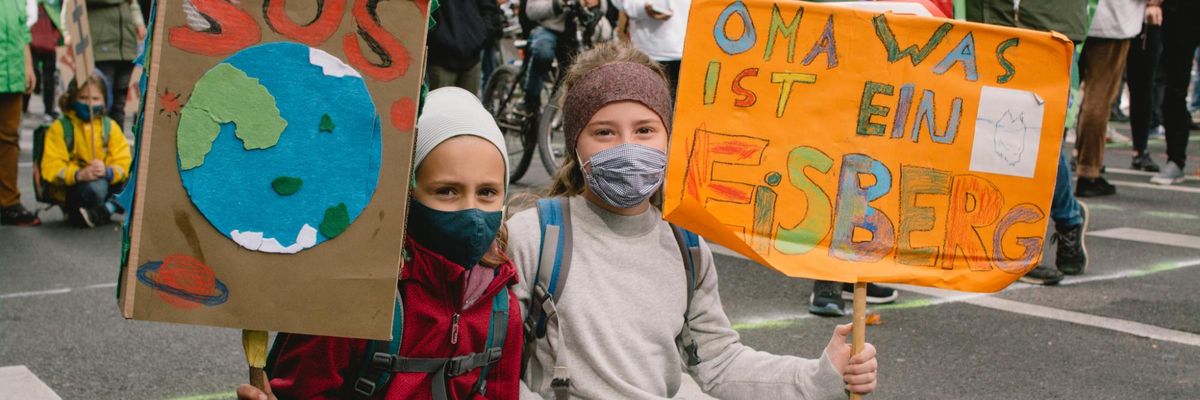
Young people sit in the street in Cologne, Germany during a Fridays for Future demonstration on September 25, 2020. (Photo: Ying Tang/NurPhoto via Getty Images)
'This Is Huge': Top Court Rules Germany's Climate Law Inadequate to Protect Future Generations
"This can change so much, not just for us here in Germany but for activists worldwide."
In a ruling hailed as a landmark victory for the climate justice movement, Germany's top constitutional court said Thursday that the nation's 2019 climate law violates young people's "fundamental rights to a human future" by failing to set adequate emissions-reduction targets.
The court ruled that in their current form, the elements of Germany's Federal Climate Protection Act "governing national climate targets and the annual emission amounts allowed until 2030 are incompatible with fundamental rights insofar as they lack sufficient specifications for further emission reductions from 2031 onwards."
"Climate protection is not nice to have; climate protection is our basic right and that's official now."
--Luisa Neubauer, Fridays for Future
The law's emissions targets for 2031 and beyond, the court added, "are not sufficient to ensure that the necessary transition to climate neutrality is achieved in time" and thus "violate the freedoms of the complainants, some of whom are still very young."
The new ruling gives the German government until the end of next year to improve the climate law, which requires the country to reduce greenhouse gas emissions by at least 55% by 2030 relative to 1990 levels and ensure almost no carbon emissions by 2050. A signature achievement of German Chancellor Angela Merkel, the law has long been criticized by scientists and activists as woefully insufficient.
"This is huge," Luisa Neubauer, a Berlin-based Fridays for Future activist and one the plaintiffs in the case, told The Guardian in response to the ruling. "Climate protection is not nice to have; climate protection is our basic right and that's official now."
"This can change so much, not just for us here in Germany but for activists worldwide," Neubauer added on Twitter.
The case was brought in January 2020 by nine climate activists then between the ages of 15 and 32 and is supported by Greenpeace, Friends of the Earth Germany, and other advocacy organizations.
Sophie Backsen, a 22-year-old plaintiff, said in a statement Thursday that "the court's decision is a huge success for us young people who are already affected by the climate crisis--I am very happy!"
"It has become clear that essential parts of the Federal Climate Protection Act are not compatible with our fundamental rights," said Backsen, whose family lives on the German island of Pellworm. "Effective climate protection must start and be implemented now--not in 10 years. This is the only way to secure my future on my home island. The decision gives me a tailwind to keep fighting. "
Swedish climate activist Greta Thunberg, who kicked off the global Fridays for Future movement in 2018 with a solitary school strike, also applauded the German court's ruling.
"Everywhere around the world we see layer upon layer of incomplete targets and insufficient action," Thunberg tweeted. "Little by little it's starting to become exposed."
An Urgent Message From Our Co-Founder
Dear Common Dreams reader, The U.S. is on a fast track to authoritarianism like nothing I've ever seen. Meanwhile, corporate news outlets are utterly capitulating to Trump, twisting their coverage to avoid drawing his ire while lining up to stuff cash in his pockets. That's why I believe that Common Dreams is doing the best and most consequential reporting that we've ever done. Our small but mighty team is a progressive reporting powerhouse, covering the news every day that the corporate media never will. Our mission has always been simple: To inform. To inspire. And to ignite change for the common good. Now here's the key piece that I want all our readers to understand: None of this would be possible without your financial support. That's not just some fundraising cliche. It's the absolute and literal truth. We don't accept corporate advertising and never will. We don't have a paywall because we don't think people should be blocked from critical news based on their ability to pay. Everything we do is funded by the donations of readers like you. Will you donate now to help power the nonprofit, independent reporting of Common Dreams? Thank you for being a vital member of our community. Together, we can keep independent journalism alive when it’s needed most. - Craig Brown, Co-founder |
In a ruling hailed as a landmark victory for the climate justice movement, Germany's top constitutional court said Thursday that the nation's 2019 climate law violates young people's "fundamental rights to a human future" by failing to set adequate emissions-reduction targets.
The court ruled that in their current form, the elements of Germany's Federal Climate Protection Act "governing national climate targets and the annual emission amounts allowed until 2030 are incompatible with fundamental rights insofar as they lack sufficient specifications for further emission reductions from 2031 onwards."
"Climate protection is not nice to have; climate protection is our basic right and that's official now."
--Luisa Neubauer, Fridays for Future
The law's emissions targets for 2031 and beyond, the court added, "are not sufficient to ensure that the necessary transition to climate neutrality is achieved in time" and thus "violate the freedoms of the complainants, some of whom are still very young."
The new ruling gives the German government until the end of next year to improve the climate law, which requires the country to reduce greenhouse gas emissions by at least 55% by 2030 relative to 1990 levels and ensure almost no carbon emissions by 2050. A signature achievement of German Chancellor Angela Merkel, the law has long been criticized by scientists and activists as woefully insufficient.
"This is huge," Luisa Neubauer, a Berlin-based Fridays for Future activist and one the plaintiffs in the case, told The Guardian in response to the ruling. "Climate protection is not nice to have; climate protection is our basic right and that's official now."
"This can change so much, not just for us here in Germany but for activists worldwide," Neubauer added on Twitter.
The case was brought in January 2020 by nine climate activists then between the ages of 15 and 32 and is supported by Greenpeace, Friends of the Earth Germany, and other advocacy organizations.
Sophie Backsen, a 22-year-old plaintiff, said in a statement Thursday that "the court's decision is a huge success for us young people who are already affected by the climate crisis--I am very happy!"
"It has become clear that essential parts of the Federal Climate Protection Act are not compatible with our fundamental rights," said Backsen, whose family lives on the German island of Pellworm. "Effective climate protection must start and be implemented now--not in 10 years. This is the only way to secure my future on my home island. The decision gives me a tailwind to keep fighting. "
Swedish climate activist Greta Thunberg, who kicked off the global Fridays for Future movement in 2018 with a solitary school strike, also applauded the German court's ruling.
"Everywhere around the world we see layer upon layer of incomplete targets and insufficient action," Thunberg tweeted. "Little by little it's starting to become exposed."
In a ruling hailed as a landmark victory for the climate justice movement, Germany's top constitutional court said Thursday that the nation's 2019 climate law violates young people's "fundamental rights to a human future" by failing to set adequate emissions-reduction targets.
The court ruled that in their current form, the elements of Germany's Federal Climate Protection Act "governing national climate targets and the annual emission amounts allowed until 2030 are incompatible with fundamental rights insofar as they lack sufficient specifications for further emission reductions from 2031 onwards."
"Climate protection is not nice to have; climate protection is our basic right and that's official now."
--Luisa Neubauer, Fridays for Future
The law's emissions targets for 2031 and beyond, the court added, "are not sufficient to ensure that the necessary transition to climate neutrality is achieved in time" and thus "violate the freedoms of the complainants, some of whom are still very young."
The new ruling gives the German government until the end of next year to improve the climate law, which requires the country to reduce greenhouse gas emissions by at least 55% by 2030 relative to 1990 levels and ensure almost no carbon emissions by 2050. A signature achievement of German Chancellor Angela Merkel, the law has long been criticized by scientists and activists as woefully insufficient.
"This is huge," Luisa Neubauer, a Berlin-based Fridays for Future activist and one the plaintiffs in the case, told The Guardian in response to the ruling. "Climate protection is not nice to have; climate protection is our basic right and that's official now."
"This can change so much, not just for us here in Germany but for activists worldwide," Neubauer added on Twitter.
The case was brought in January 2020 by nine climate activists then between the ages of 15 and 32 and is supported by Greenpeace, Friends of the Earth Germany, and other advocacy organizations.
Sophie Backsen, a 22-year-old plaintiff, said in a statement Thursday that "the court's decision is a huge success for us young people who are already affected by the climate crisis--I am very happy!"
"It has become clear that essential parts of the Federal Climate Protection Act are not compatible with our fundamental rights," said Backsen, whose family lives on the German island of Pellworm. "Effective climate protection must start and be implemented now--not in 10 years. This is the only way to secure my future on my home island. The decision gives me a tailwind to keep fighting. "
Swedish climate activist Greta Thunberg, who kicked off the global Fridays for Future movement in 2018 with a solitary school strike, also applauded the German court's ruling.
"Everywhere around the world we see layer upon layer of incomplete targets and insufficient action," Thunberg tweeted. "Little by little it's starting to become exposed."

